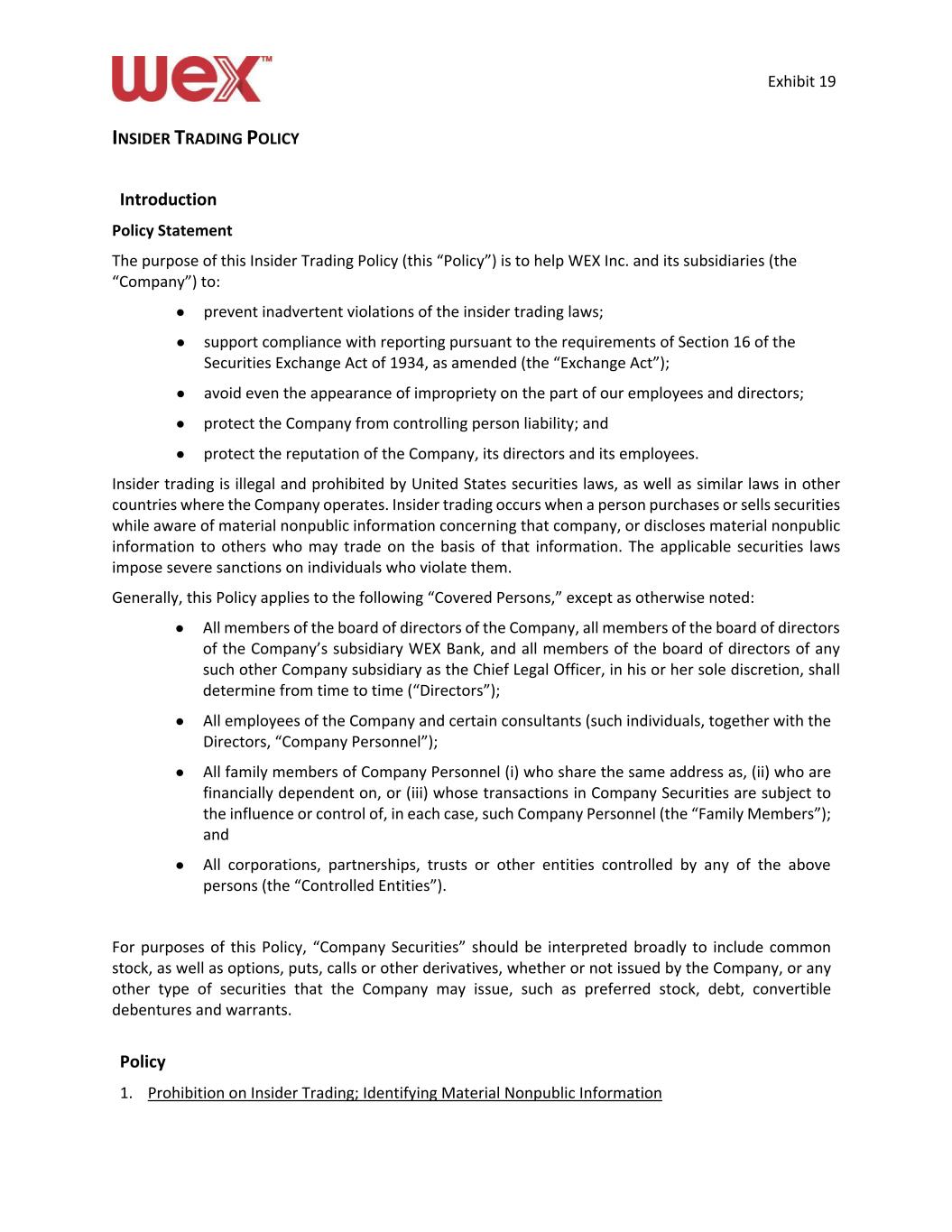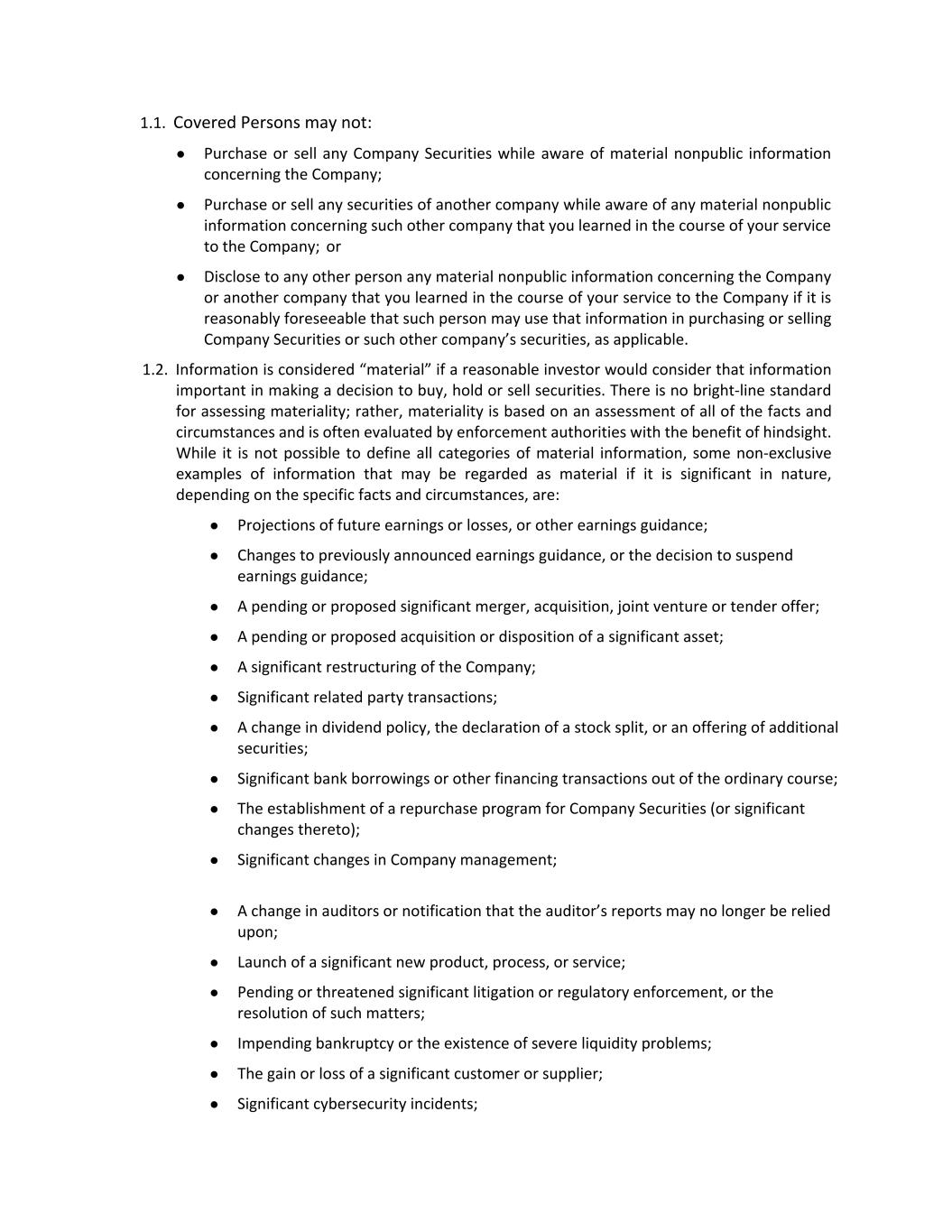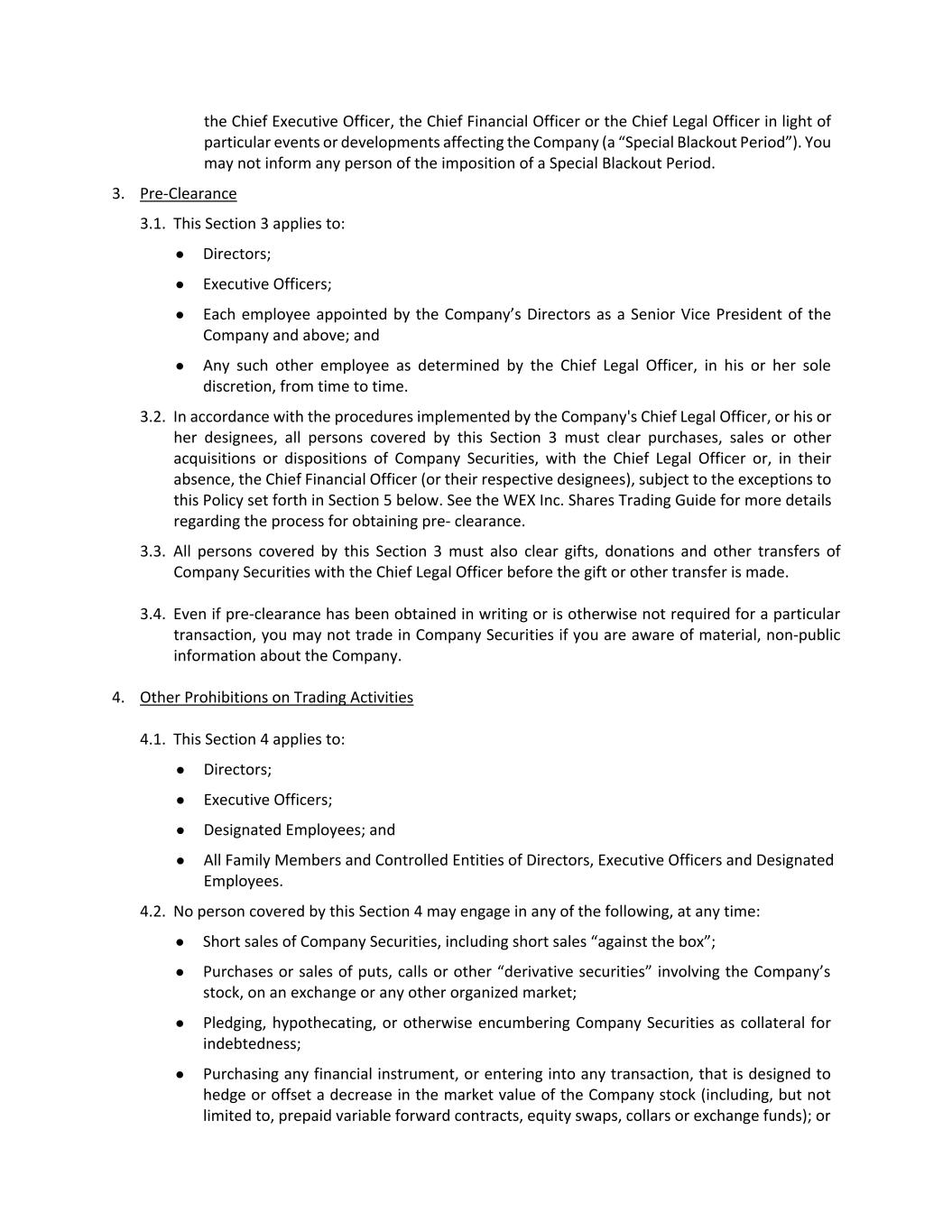
Exhibit 19 INSIDER TRADING POLICY Introduction Policy Statement The purpose of this Insider Trading Policy (this “Policy”) is to help WEX Inc. and its subsidiaries (the “Company”) to: ● prevent inadvertent violations of the insider trading laws; ● support compliance with reporting pursuant to the requirements of Section 16 of the Securities Exchange Act of 1934, as amended (the “Exchange Act”); ● avoid even the appearance of impropriety on the part of our employees and directors; ● protect the Company from controlling person liability; and ● protect the reputation of the Company, its directors and its employees. Insider trading is illegal and prohibited by United States securities laws, as well as similar laws in other countries where the Company operates. Insider trading occurs when a person purchases or sells securities while aware of material nonpublic information concerning that company, or discloses material nonpublic information to others who may trade on the basis of that information. The applicable securities laws impose severe sanctions on individuals who violate them. Generally, this Policy applies to the following “Covered Persons,” except as otherwise noted: ● All members of the board of directors of the Company, all members of the board of directors of the Company’s subsidiary WEX Bank, and all members of the board of directors of any such other Company subsidiary as the Chief Legal Officer, in his or her sole discretion, shall determine from time to time (“Directors”); ● All employees of the Company and certain consultants (such individuals, together with the Directors, “Company Personnel”); ● All family members of Company Personnel (i) who share the same address as, (ii) who are financially dependent on, or (iii) whose transactions in Company Securities are subject to the influence or control of, in each case, such Company Personnel (the “Family Members”); and ● All corporations, partnerships, trusts or other entities controlled by any of the above persons (the “Controlled Entities”). For purposes of this Policy, “Company Securities” should be interpreted broadly to include common stock, as well as options, puts, calls or other derivatives, whether or not issued by the Company, or any other type of securities that the Company may issue, such as preferred stock, debt, convertible debentures and warrants. Policy 1. Prohibition on Insider Trading; Identifying Material Nonpublic Information

1.1. Covered Persons may not: ● Purchase or sell any Company Securities while aware of material nonpublic information concerning the Company; ● Purchase or sell any securities of another company while aware of any material nonpublic information concerning such other company that you learned in the course of your service to the Company; or ● Disclose to any other person any material nonpublic information concerning the Company or another company that you learned in the course of your service to the Company if it is reasonably foreseeable that such person may use that information in purchasing or selling Company Securities or such other company’s securities, as applicable. 1.2. Information is considered “material” if a reasonable investor would consider that information important in making a decision to buy, hold or sell securities. There is no bright-line standard for assessing materiality; rather, materiality is based on an assessment of all of the facts and circumstances and is often evaluated by enforcement authorities with the benefit of hindsight. While it is not possible to define all categories of material information, some non-exclusive examples of information that may be regarded as material if it is significant in nature, depending on the specific facts and circumstances, are: ● Projections of future earnings or losses, or other earnings guidance; ● Changes to previously announced earnings guidance, or the decision to suspend earnings guidance; ● A pending or proposed significant merger, acquisition, joint venture or tender offer; ● A pending or proposed acquisition or disposition of a significant asset; ● A significant restructuring of the Company; ● Significant related party transactions; ● A change in dividend policy, the declaration of a stock split, or an offering of additional securities; ● Significant bank borrowings or other financing transactions out of the ordinary course; ● The establishment of a repurchase program for Company Securities (or significant changes thereto); ● Significant changes in Company management; ● A change in auditors or notification that the auditor’s reports may no longer be relied upon; ● Launch of a significant new product, process, or service; ● Pending or threatened significant litigation or regulatory enforcement, or the resolution of such matters; ● Impending bankruptcy or the existence of severe liquidity problems; ● The gain or loss of a significant customer or supplier; ● Significant cybersecurity incidents;

● Information that could be expected to affect a company’s stock price, whether it is positive or negative; and ● The imposition of a ban on trading in Company Securities or the securities of another company. If you are unsure whether information is material, you should either consult the Chief Legal Officer before making any decision to disclose such information (other than to persons who need to know it) or to trade in or recommend securities to which that information relates or assume that the information is material. 1.3. Information that has not been disclosed to the public is generally considered to be nonpublic information. In order to establish that the information has been disclosed to the public, it may be necessary to demonstrate that the information has been widely disseminated. Filings with the Securities and Exchange Commission (“SEC”) and press releases are generally regarded as public information. Information would likely not be considered widely disseminated if it is publicized only through the Company’s website or the Company’s social media accounts, if it is available only to the Company’s employees, or if it is only available to a select group of analysts, brokers and institutional investors. Once information is widely disseminated, it is still necessary to afford the investing public with sufficient time to absorb the information. Information should not be considered fully absorbed by the marketplace until following the second full trading day after which the information is released. If, for example, the Company were to make an announcement pre-market on Tuesday, you should not trade in Company Securities until Thursday. Depending on the particular circumstances, the Company may determine that a longer or shorter period should apply to the release of specific material nonpublic information. 2. Black Out Periods 2.1. This Section 2 applies to the following “Designated Persons”: ● All Directors; ● All Company executive officers as defined under either SEC Rule 3b-7 or Rule 16a-1(f) (the “Executive Officers”); ● Such other employees as are designated pursuant to the Insider Trading Employee Designation Procedure Insider Trading Employee Designation Procedure (or any subsequent procedure adopted by the Company) (the “Designated Employee”); ● All Family Members and Controlled Entities of Directors, executive officers and Designated Employees. 2.2. Subject to the exceptions provided in Section 5 below, Designated Persons may not purchase or sell Company Securities during any of the following time periods (each, a “Corporate Blackout Period”): ● Beginning on the date that is 28 calendar days prior to the end of each fiscal quarter and ending upon the completion of the second full trading day after the public announcement of earnings for such quarter (a “Quarterly Blackout Period”), and for the avoidance of doubt, if such public announcement of earnings is made by the Company prior to the commencement of trading on a trading day, then such day shall be deemed to be the first full trading day; or ● During such other periods as may be established in writing from time to time by the Board,

the Chief Executive Officer, the Chief Financial Officer or the Chief Legal Officer in light of particular events or developments affecting the Company (a “Special Blackout Period”). You may not inform any person of the imposition of a Special Blackout Period. 3. Pre-Clearance 3.1. This Section 3 applies to: ● Directors; ● Executive Officers; ● Each employee appointed by the Company’s Directors as a Senior Vice President of the Company and above; and ● Any such other employee as determined by the Chief Legal Officer, in his or her sole discretion, from time to time. 3.2. In accordance with the procedures implemented by the Company's Chief Legal Officer, or his or her designees, all persons covered by this Section 3 must clear purchases, sales or other acquisitions or dispositions of Company Securities, with the Chief Legal Officer or, in their absence, the Chief Financial Officer (or their respective designees), subject to the exceptions to this Policy set forth in Section 5 below. See the WEX Inc. Shares Trading Guide for more details regarding the process for obtaining pre- clearance. 3.3. All persons covered by this Section 3 must also clear gifts, donations and other transfers of Company Securities with the Chief Legal Officer before the gift or other transfer is made. 3.4. Even if pre-clearance has been obtained in writing or is otherwise not required for a particular transaction, you may not trade in Company Securities if you are aware of material, non-public information about the Company. 4. Other Prohibitions on Trading Activities 4.1. This Section 4 applies to: ● Directors; ● Executive Officers; ● Designated Employees; and ● All Family Members and Controlled Entities of Directors, Executive Officers and Designated Employees. 4.2. No person covered by this Section 4 may engage in any of the following, at any time: ● Short sales of Company Securities, including short sales “against the box”; ● Purchases or sales of puts, calls or other “derivative securities” involving the Company’s stock, on an exchange or any other organized market; ● Pledging, hypothecating, or otherwise encumbering Company Securities as collateral for indebtedness; ● Purchasing any financial instrument, or entering into any transaction, that is designed to hedge or offset a decrease in the market value of the Company stock (including, but not limited to, prepaid variable forward contracts, equity swaps, collars or exchange funds); or

● Purchases, sales or other acquisitions or transfers of Company Securities if such person acquired such equity security in connection with his or her service or employment as a director or executive officer of the Company during a “pension fund blackout period” (other than transactions exempted from such prohibitions under Section 306(a) of the Sarbanes- Oxley Act). 5. Transaction Exceptions 5.1. This Policy does not apply to the following, except as specifically noted: ● Purchases or sales of Company Securities made pursuant to a binding contract, written plan or specific instruction (a “trading plan”) which is adopted and operated in compliance with Rule 10b5-1 and any policy the Company has in place governing Rule 10b5-1 Trading Plans. ● Exercises of stock options acquired pursuant to the Company’s plans, or the surrender of shares to the Company in payment of the exercise price or in satisfaction of any tax withholding obligations arising from such exercises, in each case in a manner permitted by the applicable stock option; provided, however, that this Policy does apply to the sale of the underlying shares. For the avoidance of doubt, this Policy does apply to the cashless exercise of the option through a broker, as this entails selling a portion of the underlying stock to cover the cost of exercise. ● Vesting of restricted stock (or restricted stock units), or the surrender of shares to the Company in satisfaction of any tax withholding obligations arising from such vesting of any restricted stock (or restricted stock units); provided, however, that this Policy does apply to the sale of the underlying shares. ● Acquisitions of Company Securities under the Company’s 401(k), if permissible under the documents governing the Company’s 401(k) plan, resulting from periodic contribution of money to the plan pursuant to standard payroll deduction elections which are made pursuant to standing instructions not entered into or modified during a Corporate Blackout Period. ● Purchases made under an employee stock purchase plan operated by the Company, if such a plan exists; provided, however, that the Company Securities so acquired may not be sold during a Corporate Blackout Period. For the avoidance of doubt, this Policy does apply to elections to participate in the plan for any enrollment period. ● Other similar purchases or sales of Company Securities from or to the Company, as applicable. 6. Penalties for Violation 6.1. Violation of any of this Policy is grounds for disciplinary action by the Company, including termination of employment or service to the Company. In addition, the Company may report violations of this policy to law enforcement authorities for possible prosecution. 7. Company Assistance and Education 7.1. The Company shall periodically review this Policy and provide periodic training and reminders about federal securities law restrictions and Company policies regarding insider trading. 7.2. The Company shall provide reasonable assistance to all directors and executive officers, as requested by such directors and executive officers, in connection with the filing of Forms 3, 4 and 5 under Section 16 of the Exchange Act with respect to transactions in Company Securities. However, the ultimate responsibility, and liability, for timely filing remains with the directors

and executive officers. 8. Company Trading in Company Securities 8.1. This Section 8 applies to the Company. 8.2. The Board of Directors of the Company may from time to time authorize the Company to repurchase Company Securities under such terms and conditions that the Board may determine. The Company will not engage in transactions in Company Securities, except in compliance with applicable securities laws. 8.3. The Company’s Chief Executive Officer and Chief Financial Officer, each approves the execution of specific repurchases of the Company Securities in consultation with, and subject to prior clearance from, the Chief Legal Officer (or his or her designee). 8.4. In general, repurchases should be effected (a) when the Company is not aware of material non- public information about the Company or Company Securities, as certified by the Chief Executive Officer, Chief Financial Officer or SVP, Treasurer (b) pursuant to a contract, instruction, or plan that satisfies the requirements of Rule 10b5-1(c) under the Securities Exchange Act of 1934, as amended, or (c) otherwise in compliance with applicable law. 8.5. Repurchases shall be effected in accordance with the terms and conditions that the Board has authorized. 9. Periodic Review and Amendment 9.1. Any material amendments to this Policy, as determined at the discretion of the Chief Legal Officer, must be approved by the Board of Directors. Any non-material amendments may be made by the Chief Legal Officer and later presented to the Board of Directors.





